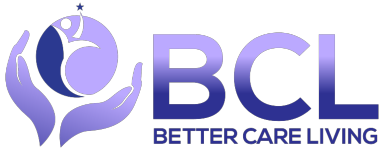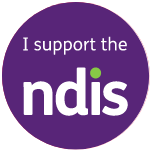FAQs
We are here to answer all your questions
What is Disability
Disability is when a significant impairment affects an individual. It includes physical, intellectual, psychiatric, sensory, neurological and learning disabilities according to Disability Discrimination Act 1992 (Cwlth). Disability can be permanent or temporary, visible or invisible. Some conditions and impairments are present from birth. Other people acquire or develop disability during their lifetime from an accident, condition, illness or injury. For some people, support requirements can increase over time. Others can experience fluctuating or episodic disability. Some people may have multiple disabilities, giving rise to different support requirements.
https://www.vic.gov.au/disability-access-and-inclusion-plan-2021-2025/disability-definition
Do you meet the disability requirement?
You meet the disability requirements if we have evidence of all of the following:
- Your disability is caused by an impairment.
- Your impairment is likely to be permanent.
- Your permanent impairment substantially reduces your functional capacityto undertake one or more of the following activities: moving around, communicating, socialising, learning, or undertaking self-care or self-management tasks.
- Your permanent impairment affects your ability to work, study or take part in social life.
- You’ll likely need support under the NDIS for your whole life.
Conditions that are likely to meet the Disability requirements
- Intellectual disability.
- Cerebral palsy.
- Genetic conditions that consistently result in permanent and severe intellectual and physical impairments.
- Spinal cord injury or brain injury resulting in paraplegia, quadriplegia or tetraplegia.Permanent blindness in both eyes.
- Permanent bilateral hearing loss.
- Amputation or congenital absence of 2 limbs.
NDIS Code of Conduct
The NDIS Code of Conduct sets the minimum standards and obligations for NDIS providers and workers. The Code of Conduct requires workers and providers who deliver NDIS supports to:
- act with respect for individual rights to freedom of expression, self-determination, and decision-making in accordance with relevant laws and conventions
- respect the privacy of people with disability
- provide supports and services in a safe and competent manner with care and skill
- act with integrity, honesty, and transparency
- promptly take steps to raise and act on concerns about matters that might have an impact on the quality and safety of supports provided to people with disability
- take all reasonable steps to prevent and respond to all forms of violence, exploitation, neglect, and abuse of people with disability
- take all reasonable steps to prevent and respond to sexual misconduct.
Better Care living is fully compliant with NDIS Code of Conduct. These are guidelines available to help us understand our obligations under the NDIS Code of Conduct.
What is Psychosocial Disability
Psychosocial Disability refers to a psychological and social condition that may arise from a mental illness. It usually impacts people’s quality of life, their ability to live independently and perform daily activities. A psychosocial disability may restrict a person’s ability to complete daily tasks, concentrate, interact with others, manage stress, cope with multiple tasks and so on.
Psychosocial Disability Key Points
- If you have a mental illness that is affecting your ability to perform daily tasks, participate in the community and live a fulfilling life, you may be able to receive NDIS support.
- The NDIS does not fund the treatment of psychosocial disability, but rather provides support to help you perform everyday tasks.
- To be eligible for mental health support under the NDIS, you must first provide evidence of your psychosocial disability and how this impacts your life daily.
How can NDIS help if you have Psychosocial Disability?
Some examples of how the NDIS can help include:
- Funding for therapies such as seeing a psychologist, counsellor, psychiatrist or social worker.
- Transport to get to medical appointments and support groups.
- Assistance in learning how to travel independently on public or private transport.
- Support in setting personal and professional goals, budgeting and paying bills.
- Self-care assistance, such as hygiene, showering and grooming.
- Support to help you get out in your community to build friendships.)
- Assistance with shopping, meal preparation and cooking.
- Support with cleaning around your house or garden.
- Help to access Centrelink.
- Assistance with finding the right accommodation for you (including organising support in the home if required).
- Support coordination or psychosocial recovery coaching and assistance with the NDIS.
Benefits of a psychosocial recovery coach over a support coordinator
- More experience with what supports might be needed by a person with psychosocial disability.
- More experience with mental health systems and how to best access them.
- More understanding of fluctuating conditions and how to plan for ‘good’ and ‘bad’ days.
- More understanding of what goals might be involved in a recovery journey and the importance of independence and self-determination.
- More focus on how an individual’s experiences, gender, sexuality, family culture and community influence their current state of mind.
- Support to develop an individual recovery plan.
- Dedication to a trusting relationship between the coach and participant, which is needed for recovery-oriented practice to work.
What is SIL
Supported Independent Living (SIL) is one type of support to help you live in your home. It includes help or supervision with daily tasks, like personal care or cooking meals. It helps you live as independently as possible, while building your skills. Supported independent living is for people with higher support needs, who need some level of help at home all the time. It is best suited to people with a disability who have higher support needs. This means you need a significant amount of help throughout the day, 7 days a week. This includes overnight support.
How do you apply for the NDIS?
Applying to the NDIS is how you let us know you want to become an NDIS participant.
If you’re aged 7 and older, there are a few ways you can apply:
- Your local area coordinator or local NDIS office can help you apply. They can help you through the application process and be your point of contact. Find your nearest location.
- You can apply over the phone on 1800 800 110.
- You can complete an NDIS application form.
For children younger than 7, we encourage families to talk to an early childhood partner before applying to the NDIS. They can provide supports to children before they apply, and let families know if the NDIS is right for their child.
https://ourguidelines.ndis.gov.au/home/becoming-participant/applying-ndis/how-do-you-apply-ndis
Do you meet the residency requirements?
You must be an Australian citizen, or have one of two visa types that means you can live here.
- A permanent visa
- A protected special category visa– this is only for some citizens of New Zealand.
You must live in Australia. This means Australia is your home and you spend most of your time here.
NDIS – What does it mean?
National Disability Insurance Scheme.
National: The NDIS is being introduced progressively across all states and territories.
Disability: The NDIS provides support to eligible people with intellectual, physical, sensory, cognitive and psychosocial disability. Early intervention supports can also be provided for eligible people with disability or children with developmental delay.
Insurance: The NDIS gives all Australians peace of mind if they, their child or loved one is born with or acquires a permanent and significant disability, they will get the support they need.
Scheme: The NDIS is not a welfare system. The NDIS is designed to help people get the support they need so their skills and independence improve over time.
There are around 4.3 million Australians who have a disability. Within the next five years, the National Disability Insurance Scheme (NDIS) will provide more than $22 billion in funding a year to an estimated 500,000 Australians who have permanent and significant disability. For many people, it will be the first time they receive the disability support they need.
The NDIS can provide all people with disability with information and connections to services in their communities such as doctors, sporting clubs, support groups, libraries and schools, as well as information about what support is provided by each state and territory government
Some Mental Illnesses that result in psychosocial disabilities
- Schizophrenia
- Schizoaffective disorder
- Bipolar disorder
- Depression
- Anxiety
- Obsessive compulsive disorder (OCD)
- Post-traumatic stress disorder (PTSD)
- Phobia
NDIS Eligibility for Mental Health Support
To be deemed eligible you must experience difficulties in doing at least one of the below areas, without support or with reduced functional capacity:
- Communication
- Social interaction
- Learning
- Mobility
- Self-care
- Self-management
Psychosocial Recovery Coaches and what they do
Psychosocial recovery coaches help people with psychosocial disability to live a fulfilling life. They work on supporting you to be the best you can be through positive, hope-based recovery planning. Also known simply as recovery coaches, they work with National Disability Insurance Scheme (NDIS) participants, their families, carers, support services and other organisations to coordinate supports and make sure participants get the most out of their NDIS plan.
- Recovery coaches provide a more targeted coordination service for people with psychosocial disability which is focused on improving your health.
- Coaches can help with a wide range of factors in your life from connecting with friends and family to learning about self-advocacy.
- The focus of recovery coaches is to assist with recovery-oriented practice, which empowers and supports an individual to make their own choices, live a meaningful, satisfying and purposeful life, and be a valued member of the community.
What do they do?
- Implement programs that will assist you regain and improve you coping abilities and recovery
- Helping you develop goals for your life through recovery planning.
- Coaching you to build on strengths, knowledge, skills, resilience, and decision-making.
- Assisting you with social networking and to connect positively with family and friends.
- Providing information about mental health which is tailored to your situation and needs.
- Coordinating NDIS supports and that of other mental health services and resources for you.
- Collaborating with other services to ensure that the supports you get are your goals and what you need.
- Advocating appropriate health and mental health support that is client-focused for you when you are unwell.
- Assisting you in capacity-building and learning about self-advocacy.
- Supporting you and your significant others in combating the stigma associated with mental illness.
- Assisting you in skill building and through psychoeducation help strengthen your resistance to acute stress and relapse.
- Engaging you in a range of evidence-based therapeutic interventions to optimize your functional recovery.
Choosing a psychosocial recovery coach
- The first decision to make is whether you would like a coach with lived experience of mental health struggles or a coach who has learned about mental health through their education and work experience.
- Both types of recovery coaches are qualified to help you, so it is up to personal preference which one you choose. You don’t have to stick with either a coach with lived experience or a coach with learned experience forever and you can switch between the two types.
- You can also choose to have a support coordinator rather than a recovery coach, having a recovery coach is not mandatory for people with psychosocial disability.
- However, the NDIS is unlikely to fund both a recovery coach and a support coordinator for you as a recovery coach will do much of the work that a support coordinator would do.
If you are still unsure about whom to choose, talk to Better Care Living. We can assist you make an informed choice based on your current needs.



